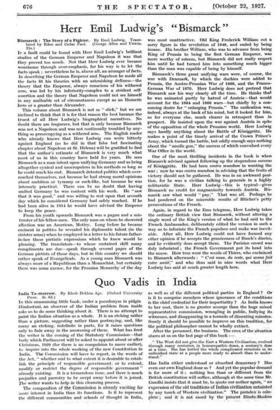Herr Emil Ludwig's " Bismarck"
Itismarck : The Story of a Fighter.. By Emil Ludwig. Trans- lated by Eden and Cedar Paul. (George Allen and Unwin. 21s.)
IF a fault could be found with Herr Emil Ludwig's brilliant studies of the German Emperor and Napoleon it Was that they proved too much. Not that Herr Ludwig ever became wearisome through over-emphasis, for his way is to Jet the facts speak ; nevertheless he is, above all, an arranger of facts. In describing the German Emperor and Napoleon he made all the facts fit his theories. with an astonishing _deftness—the theory that the Emperor, always conscious of his withered arm, was led by his inferiority-complex to a strident self- assertion and the theory that Napoleon could not see himself in any malleable set of circumstances except as an Homeric hero or a greater than Alexander.
This volume about Bismarck is not so "slick," but we are inclined to think that it is for that reason the best because the truest of all Herr Ludwig's biographical narratives. No doubt there are lcmgueurs, but that is only because Bismarck was not a Napoleon and was not continually troubled by any- thing so preoccupying as a withered arm. The English reader who already knows that Herr Ludwig can write bitterly against England (as he did in that false but fascinating chapter about Napoleon at St. Helena) will be gratified to find that the author's estimate of Bismarck is very much what most of us in this country have held for years. He sees Bismarck as a man intent upon unifying Germany and as being altogether cynical and unscrupulous in his methods so long as he could reach his end., Bismarck detested politics which over- reached themselves, not because he had strong moral opinions about ambition- or tyranny or such-like, but because he was intensely practical. There can be no doubt that having unified Germany he was content with his work. He "saw that it was good," and was willing to rest upon that seventh day which he considered Germany had safely reached. If he had been alive in 1914 he would have advised the Emperor to keep the peace.
From his youth upwards Bismarck was a pagan and a mis- .
truster of his fellow-men. The only man on whom he showered affection was an American, Motley. Long before he became eminent in politics he revealed his diplomatic talent (in the Sinister sense) when he employed in a letter to his future father-. in-law those pietistic expressions which he knew would be pleasing. The translators—to whose sustained , skill many compliments are due—speak through several pages of the German pietists of those days, but in this country we should rather speak of Evangelicals. As a young man Bismarck was always more of a Republican than a Monarchist, but certainly there was some excuse, for. the Prussian Monarchy of the day
was most unattractive. Old King Frederick William cut a sorry figure in the revolution of 1848, and ended by being insane. His brother William, who was to advance from being King Of Prussia to being the first German Emperor, was more worthy of esteem, but Bismarck did not really respect him until he had turned him into something much bigger than the man was capable of being by himself.
Bismarck's three great unifying wars were, of course, the war with Denmark, by which the duchies were added to Prussia, the Austro-Prussian War of 1866, and the Franco- German War of 1870. Herr Ludwig does not pretend that Bismarck saw his way clearly all the time. He thinks that he was animated partly by hatred of Austria—that would account for the 1864 and 1866 wars—but chiefly by a con- suming desire for "enlarging Prussia." The unification was, indeed, always at the back of his mind, but it looked for him, as for everyone else, much clearer in retrospect than in prospect. He insisted upon the war against Austria in spite of the opposition of the whole Prussian world. Herr Ludwig says hardly anything about the Battle of Koniggritz. He makes a point of the timely arrival of the Crown Prince's Army, which turned the battle, but oddly enough says nothing about the "needle gun," the success of which convulsed every War Office in the world.
One of the most _thrilling incidents in the book is when Bismarck advised against following up the stupendous success of Koniggratz. He had been contra .mundum in wanting the war, now he was contra mundum in advising that the fruits of victory should not be gathered. He was in an awkward posi- tion, for he was a civilian talking. to generals in a highly Militaristic State.. Herr Ludwig—this is typical—gives Bismarck- no credit for magnanimity toivarcii Austria Bis- marck saw What would "pay." That was all. Perhaps he had pondered on the miserable results of Blucher's petty persecutions of the French.
Again, in regard to the Ems telegram, Herr Ludwig takes the ordinary ,British view that Bismarck, without altering a single word of the King's version of what he had said to the French Ambassador, deliberately edited the version in such a way as to infuriate the French populace and make war inevit- able. After all, Herr Ludwig could not have formed any other opinion if he accepts the genuineness of Busch's diaries, and he evidently does accept them. The Parisian crowd was duly infuriated ; the French Government put its head into the noose. HOW true were the words of Thiers, who exclaimed to Bismarck afterwards : " Cest nous, du reste, qui avons fait votre unite," and who thus said in 'nine words what Herr Ludwig has said at much greater length here.


























































 Previous page
Previous page